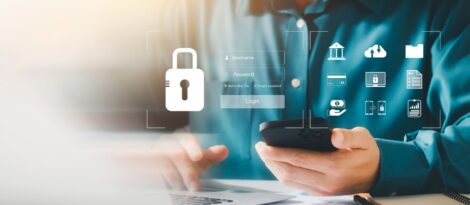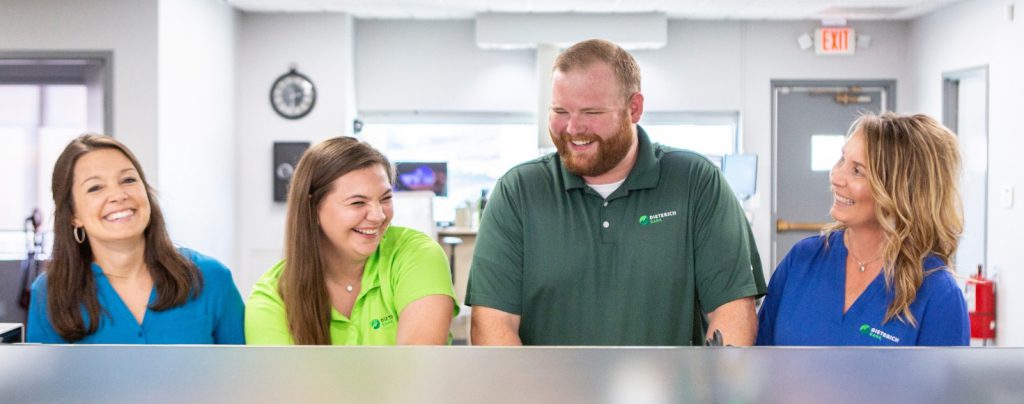As technology evolves, so do the tactics used by fraudsters. In 2025, cybercriminals are more sophisticated than ever, using tools like artificial intelligence, voice cloning, and phishing schemes to target consumers and businesses alike. At Dieterich Bank, we believe financial security starts with awareness. Here’s what to watch for—and how to protect yourself in today’s digital-first world.
AI-Powered Scams Are on the Rise
One of the most concerning threats in 2025 is the rise of deepfake scams and synthetic voice fraud. Criminals are now able to replicate the voice of a loved one or the appearance of a trusted professional to request money or sensitive information. These scams are especially effective because they seem so personal and convincing.
To stay safe, always verify any unexpected requests by calling the person directly using a known phone number. Never rely on caller ID, email addresses, or links sent to you. If you feel rushed or pressured to act, take a step back—that urgency is often a red flag.
Phishing and Smishing Are More Convincing Than Ever
Phishing emails and smishing text messages aren’t new, but AI has made them harder to spot. Scammers are now crafting personalized messages that reference your name, employer, or even recent online activity. These messages often include malicious links or attachments designed to steal your login credentials or install malware.
To protect yourself, avoid clicking on any links or downloading attachments from unknown senders. Always inspect the full email address, and enable multi-factor authentication (MFA) on your banking, email, and investment accounts for an added layer of protection.
Investment and Romance Scams Continue to Target Consumers
Another persistent scam combines online romance with bogus investment opportunities. Fraudsters often build online relationships over weeks or months, eventually persuading victims to invest in cryptocurrency platforms that don’t actually exist. These “pig butchering” scams are among the most financially devastating.
If you meet someone online who begins to talk about investing—or pressures you to move money into a new account—proceed with caution. Never send funds, share access to your digital wallet, or download unknown apps without fully verifying the source.
Peer-to-Peer Payment Apps Aren’t Immune to Fraud
Apps like Zelle, Venmo, and Cash App offer speed and convenience—but they also come with risk. Scammers may impersonate legitimate sellers or bank employees, encouraging users to send payments that can’t be reversed.
Only use P2P apps with people you know and trust. If you receive a payment request from someone you don’t recognize or are told to “verify” your identity by sending money to yourself, stop immediately and contact your bank.
Ransomware Attacks Are Becoming More Personal
What used to be a threat for large organizations is now impacting individuals. Ransomware attacks can lock up your personal files, demand payment, and leave you with few options for recovery.
To reduce your risk, keep your devices updated with the latest security patches and antivirus software. Back up important documents regularly—ideally on a separate, offline storage device or encrypted cloud platform.
Fake Job and Rental Listings Are Common Entry Points
Scammers continue to use fake job ads and rental listings to collect personal data or upfront payments. These scams often appear on legitimate websites and may use logos and branding from real companies.
Always verify opportunities before sharing sensitive information or sending money. Watch for vague job descriptions, poor grammar, and requests for payment via gift cards or wire transfers—all of which are classic scam indicators.
Identity Theft Remains a Top Concern
Even in 2025, identity theft remains one of the most common types of fraud. Criminals can use pieces of your personal information to create synthetic identities or open fraudulent accounts in your name.
Be proactive by checking your credit reports at AnnualCreditReport.com at least twice a year. Consider placing a credit freeze if you’re not planning to apply for loans or credit cards anytime soon. Avoid oversharing personal details—such as your birthday, hometown, or pet’s name—on social media.
Passwords and MFA Are Still Critical
Your password is the front door to your digital life. If it’s weak or reused, you’re giving criminals an open invitation.
Use a password manager to create strong, unique passwords for each account. Enable MFA whenever possible—especially for banking, retirement, and email platforms. Even if a scammer obtains your password, MFA makes it much harder for them to gain access.
Watch Out for Fraudulent Apps
Cybercriminals have become skilled at creating lookalike apps that mimic popular financial tools. These fake apps can steal your login information or compromise your device.
Only download apps from official app stores like the Apple App Store or Google Play. Double-check the developer’s name, read reviews, and avoid apps that ask for unnecessary permissions—like access to your microphone or location.
When in Doubt, Slow Down
Urgency is one of the most common signs of a scam. If someone is pressuring you to act fast, it’s time to pause and verify. Whether it’s a phone call, text message, or email, trust your instincts. Scammers want you to act before you have time to think.
If something doesn’t feel right, contact Dieterich Bank directly using a number listed on our official website—not a link or phone number provided in a suspicious message.
What to Do If You Suspect Fraud
If you believe your personal or financial information has been compromised, take these steps immediately:
Stop all communication with the suspected scammer.
Change passwords for any affected accounts.
Contact Dieterich Bank to report the incident and secure your accounts.
Report fraud to the FTC, IC3.gov, or your local law enforcement agency.

We’re Here to Help
At Dieterich Bank, your financial safety is our priority. If you have questions, notice unusual activity, or just want a second opinion about a suspicious message, we’re here for you.
Visit www.dieterichbank.com/contact-us or stop by your local branch to speak with a team member. Let’s work together to keep your financial future secure.






